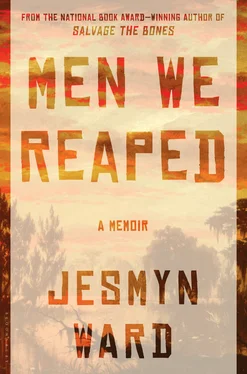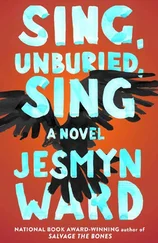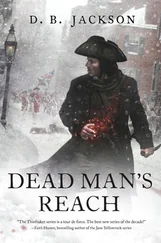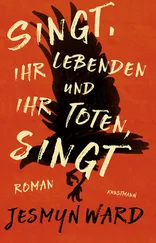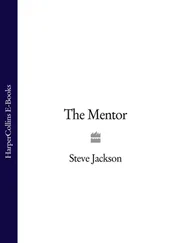And every day I was eyeing the tracks, the coming train, the third rail with its protective wooden shield, and wondering why I was alive and my brother was a year, two years dead. Each day I descended into the belly of the city, eyeing those tracks. And I thought about my family and how they would feel to lose me and Joshua, but they were so far away and my misery and grief and loneliness were so close. It slept with me. It walked with me down the crowded streets. I imagined my brother sometimes, when I was more lonely and desperate, imagined him walking to my right and slightly behind me, throwing an arm across my shoulders, and it would comfort me until I realized I was still alone and he was still dead, that he could not walk with me through those building-shadowed streets, through the garbage-stinking heat and the insidious icy snow, that he could not pull a coat over my head and protect me.
Sometimes I eyed my wrists, thought of how easy it would be to take a razor across the left one by wielding the blade with my right hand, and wondered if I could bleed out from just managing one cut. So I got a tattoo of my brother’s signature on the inside of my left wrist so that it seemed like my brother had signed his name on me before he died, had made his mark across the cutting line. I did it because I knew that I could never make that fatal cut across Joshua’s name. And when I fought through the crowds in Grand Central Station while trying to find a place to eat, a place where I could sit in a corner alone and disappear into the wall behind me, while I walked and fumbled past woman after man, felt all these people touching and crowding me while making me realize that I had never been so lonely, so alone, even though I was surrounded by young men in suits and older women in black woolen coats and sticky-faced children, I fantasized about cutting the right wrist with my left hand, so I got another tattoo in my brother’s handwriting across the other cutting line on the inside of my right wrist. Love brother is how he signed the one letter he wrote me while I was in college. Love brother is what the tattoo says.
After I left New York, I found the adage about time healing all wounds to be false: grief doesn’t fade. Grief scabs over like my scars and pulls into new, painful configurations as it knits. It hurts in new ways. We are never free from grief. We are never free from the feeling that we have failed. We are never free from self-loathing. We are never free from the feeling that something is wrong with us, not with the world that made this mess.
Death spreads, eating away at the root of our community like a fungus. In 2008, a seventeen-year-old girl named Dariane attempted to cross the tracks in Pass Christian and was hit by a train. A few winters ago, Rog’s sister Rhea died of septicemia from pneumonia, seven years after her brother died. A couple of years ago, a boy named Matt, who’d been like a younger brother to C. J., was shot; he crawled into the woods next to the road and died. Less than a year ago, a young woman named Shabree was stabbed to death by her boyfriend and left nude and bloody in the bed they shared; when relatives finally found their way to her house and her six-year-old let them in the door, she told them her mother was asleep and covered in ketchup. This is why I choose the option of a life insurance plan at every job I work. This is why I hate answering my phone. This is why fear roots through me when I think of my nephew, who is funny and even-shouldered and quiet, when I think of what waits for him in the world.
Yet I’ve returned home, to this place that birthed me and kills me at once. I’ve turned down more-lucrative jobs, with more potential for advancement, to move back to Mississippi. I wake up every morning hoping to have dreamed of my brother. I carry the weight of grief even as I struggle to live. I understand what it feels like to be under siege.
It is an awful weight. As the years pass, I find my memory shrinking and adhering to photos. I look at a picture of Joshua on his last birthday with a coconut cake bearing one burning candle and my brother a crooked smile, and I think: I remember that day . I look at another photo of him with his arm in the air, posing for me with all the other boys from the neighborhood in the middle of the street, and I remember the way he complained about my big camera and called me a tourist when I told them to stop for a picture on our walk down to the park. When I see him in profile, his eyes closed, wearing a red shirt, I think of the day I took the photo, how I had to look up to him to take it and the sun shone on him, blurred his edges, and I’d said to him: Look at my brother! He’s so cute. Just look at him!
It is more awful when I see him in motion on old videotapes after not having seen him, except in dreams, for years. My mother found an old VHS tape and called me and Nerissa and Charine to watch it. She popped the video in the machine and sat back, her face impassive. I perched on the front of the bed, closest to the TV, and my sisters scooted behind me. On the screen, my brother walked through the living room of our old trailer, with its maroon carpet and cream walls, wearing light-colored jeans and a gray T-shirt. I had forgotten he was so tall. My nephew is one year old in the video, and he is wearing a diaper and nothing else. My sisters and I are in the corner of the frame. Charine presses play on a radio, and rap music sounds. My nephew throws his head back, bounces, tries to catch the beat. Dance , a voice says. Dance, nephew .
“Who is that?” Charine asked. “Who’s talking?”
Come on, nephew. Dance .
I knew who it was. The voice sounded like mine, but deeper. Harder.
“It’s Josh,” Nerissa said.
I’d forgotten.
Do this , Josh says, and he is bouncing like my nephew, dancing. On the video, we laugh. I leaned forward, my eyes eating up my brother like a great hungry mouth, my body: a starved stomach. I would never be full. I rocked, sobbed.
Look at him , my brother says.
“I just miss him so much,” I said. I could not help saying it: the words came out of me wet and ragged, and I could not stop for the hunger in me.
He’s dancing , Josh says.
Behind me, my mother and sisters’ faces were wet.
Dance , my brother says.
Every year on the day he died, I wake up to the dread of another year passing. I lock myself in my room, wherever I am living, and I cry until my eyes swell shut. And at the edge of the longing, the terror that I will forget who he was and forget our lives together immobilizes me, pulls me down further, until I am like someone in those cartoons from our youth, stuck in a quagmire of quicksand, mired in the cold, liquid crush, and then: drowning. After Joshua died, my father stopped working, lived on Top Ramen and hot dogs by working odd jobs, and watched television on two different sets at the same time for hours a day. My mother cleans my brother’s grave every few weeks, picking stray grass, brushing the sand to an even smoothness. Every death anniversary, she takes to her room, closes her blinds, wraps herself in silence and darkness. Every year on his birthday, she buys mums for his grave and cleans the small ceramic figures of angels and teddy bears she’s placed around it, while Nerissa and Charine attach balloons, one for every birthday year, this year thirty-three, to his headstone. “I only dream of him as a child,” my mother says. “He’s always my little boy.”
This is grief.
But this grief, for all its awful weight, insists that he matters. What we carry of Roger and Demond and C. J. and Ronald says that they matter. I have written only the nuggets of my friends’ lives. This story is only a hint of what my brother’s life was worth, more than the nineteen years he lived, more than the thirteen years he’s been dead. It is worth more than I can say. And there’s my dilemma, because all I can do in the end is say.
Читать дальше
